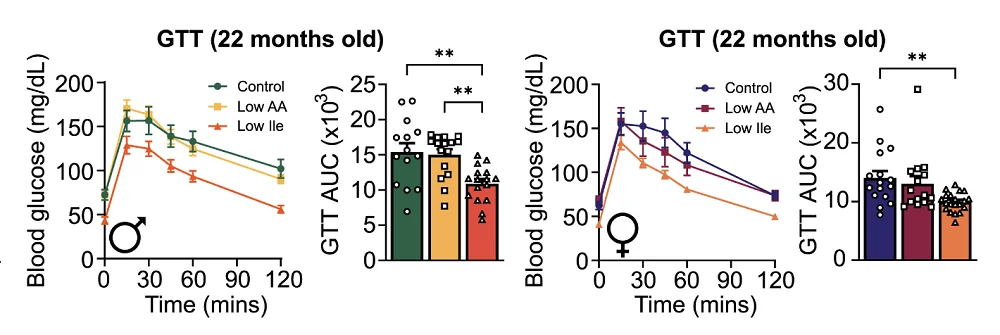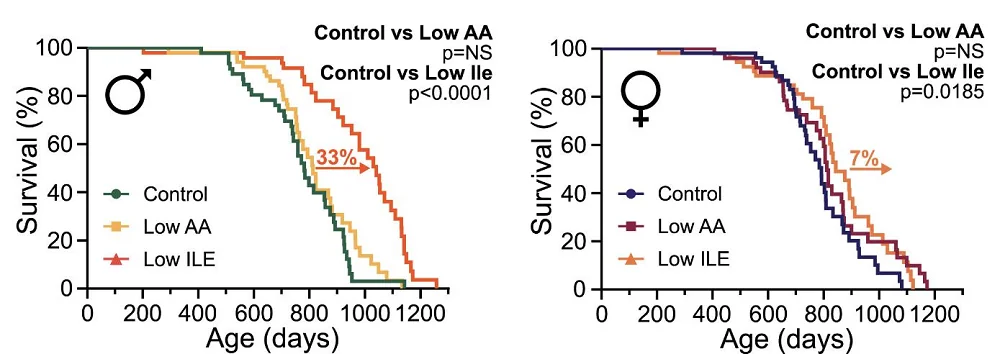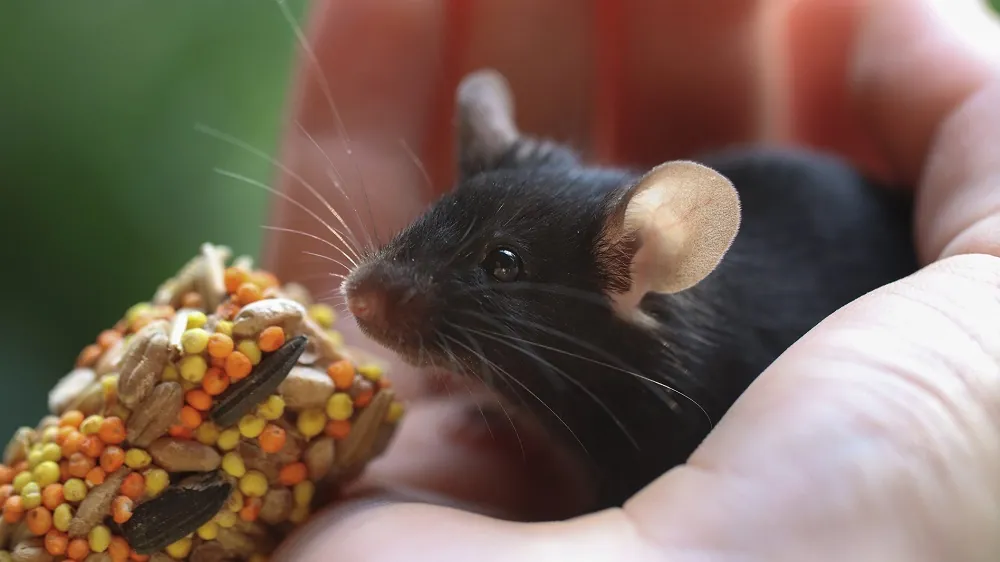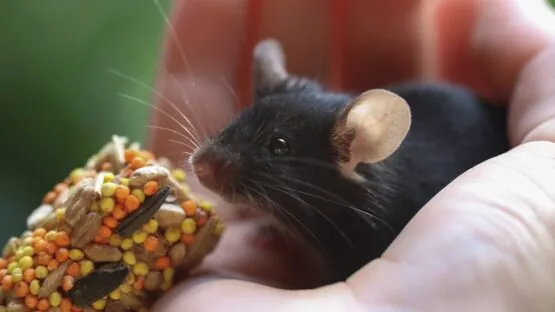A new study reports a massive 33% increase in median lifespan in male genetically heterogeneous mice following prolonged isoleucine restriction [1].
Not all calories are created equal
Caloric restriction is the most powerful life-extending intervention in rodents and primates [2], but the needed magnitude (about 30% fewer calories) is virtually impossible to maintain in humans for long. Yet, the key might not be the number of calories, but their source.
Recent years have seen heated debate about the recommended intake of protein and specific amino acids. On one hand, low protein intake is associated with a major reduction in cancer and overall mortality in people 65 and younger [3]. On the other hand, in older people, high protein intake might be needed to counteract frailty. To complicate things even further, a recent twin study found that higher protein intake is paradoxically associated with sarcopenia [4].
Of all amino acids, methionine has received the most attention. Methionine restriction extends healthspan and lifespan in various animal models [5]. Promising results have also been reported for the three branch-chained amino acids (BCAAs): leucine, isoleucine, and valine [6].
In this new study, a group of researchers who previously reported the health benefits of isoleucine restriction in genetically homogeneous B6 mice applied the same intervention to genetically heterogeneous HET3 mice. This is a step forward, suggesting high generalizability of the results.
More calories, less weight
9-week-old mice were put on either an isoleucine-restricted diet (Low Ile), or a protein-restricted one with lower levels of all amino acids (Low AA). Per weight, all three chows (including the regular one for the control group) had identical caloric density and fat contents. In the Low AA diet, carbohydrates were used to replace calories from amino acids, while in the Low Ile diet, non-essential amino acids replaced calories lost due to isoleucine restriction.
Interestingly, both study groups consumed much more calories than controls. The Low AA group still consumed less amino acids than controls, while the Low Ile group consumed less isoleucine but more total amino acids than the two other groups. Despite getting more calories, body weight in the Low AA group remained on par with that of controls, while the Low Ile group quickly lost weight over the first week of the experiment and stayed lean.

Here, sex differences began to emerge, with female Low Ile mice gaining some weight, although less than female mice in the two other groups.
How did the Low AA and Low Ile groups manage to stay at least as lean as controls despite higher caloric intake? Apparently, by maintaining much higher levels of activity and energy expenditure. Interestingly, Low Ile mice were very similar in their activity levels and caloric intake to Low AA mice, yet they stayed much leaner.
Massive sex-dependent increase in lifespan
To see whether isoleucine restriction could promote healthy aging, the researchers ran a longer experiment, with mice put on different diets at six months of age. The body weight dynamic was largely similar to the first experiment (although all groups lost weight during the second half of life). Importantly, Low Ile mice of both sexes showed better blood glycemic control than Low AA mice or controls.

Most importantly, isoleucine restriction led to a 33% percent increase in median lifespan and to some increase in maximum lifespan in male mice vs controls. This result is one of the most impressive for any intervention ever tested in rodents, especially in HET3 mice. For females, however, the increase in maximum lifespan was only 7%. In the Low AA group, no significant changes vs controls were recorded.

In accordance with the lifespan results, male, but not female, Low Ile mice experienced significantly less frailty than the two other groups. Cancer is the cause of death in more than 80% of HET3 mice. Low Ile males were significantly less likely to get cancer during their lives, but Low Ile females were not. Interestingly, the benefits of isoleucine restriction seemed to be more pronounced in young mice than in older ones. For instance, the considerable gap in fitness observed in young Low Ile mice versus controls all but closed by the age of 28 months. The robust molecular changes caused by the Low Ile diet in young mice also seemed to peter out by then.
“We like to say a calorie is not just a calorie,” says Dudley Lamming, a professor and metabolism researcher at the University of Wisconsin School of Medicine and Public Health, the study’s corresponding author. “Different components of your diet have value and impact beyond their function as a calorie, and we’ve been digging in on one component that many people may be eating too much of.”
While the lifespan results are undoubtedly impressive, many questions remain. For instance, some of the effects of the Low Ile diet may be explained by the abundance of other amino acids in it. This goes against previous research demonstrating some lifespan and healthspan benefits of protein restriction, but some amino acids may have different effects on fitness and lifespan than others.
Foods high in isoleucine include beef, chicken, pork, fish, tofu, dairy, beans, lentils, whole grains, nuts, seeds, and peas. However, it is not yet clear how the study’s findings might apply to humans.
Literature
[1] Green, C. L., Trautman, M. E., Chaiyakul, K., Jain, R., Alam, Y. H., Babygirija, R., … & Lamming, D. W. (2023). Dietary restriction of isoleucine increases healthspan and lifespan of genetically heterogeneous mice. Cell Metabolism, 35(11), 1976-1995.
[2] Pifferi, F., Terrien, J., Marchal, J., Dal-Pan, A., Djelti, F., Hardy, I., … & Aujard, F. (2018). Caloric restriction increases lifespan but affects brain integrity in grey mouse lemur primates. Communications biology, 1(1), 30.
[3] Levine, M. E., Suarez, J. A., Brandhorst, S., Balasubramanian, P., Cheng, C. W., Madia, F., … & Longo, V. D. (2014). Low protein intake is associated with a major reduction in IGF-1, cancer, and overall mortality in the 65 and younger but not older population. Cell metabolism, 19(3), 407-417.
[4] Ni Lochlainn, M., Bowyer, R. C., Welch, A. A., Whelan, K., & Steves, C. J. (2023). Higher dietary protein intake is associated with sarcopenia in older British twins. Age and Ageing, 52(2), afad018.
[5] Orentreich, N., Matias, J. R., DeFelice, A., & Zimmerman, J. A. (1993). Low methionine ingestion by rats extends life span. The Journal of nutrition, 123(2), 269-274.
[6] Richardson, N. E., Konon, E. N., Schuster, H. S., Mitchell, A. T., Boyle, C., Rodgers, A. C., … & Lamming, D. W. (2021). Lifelong restriction of dietary branched-chain amino acids has sex-specific benefits for frailty and life span in mice. Nature Aging, 1(1), 73-86.




